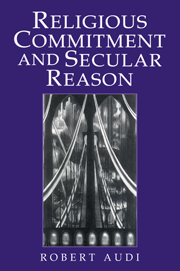Book contents
- Frontmatter
- Contents
- Preface
- PART ONE THE FOUNDATIONS OF DEMOCRACY AND THE SEPARATION OF CHURCH AND STATE
- PART TWO THE ETHICS OF CITIZENSHIP AND THE BALANCE OF RELIGIOUS AND POLITICAL ARGUMENTS
- 4 Religious Convictions and Secular Reasons
- 5 Religion and Ethics: Toward Integration
- PART THREE CIVIC VIRTUE AND POLITICAL ACTIVISM IN A RELIGIOUSLY PLURALISTIC DEMOCRACY
- Conclusion: Ethics, Religion, and Democracy
- Notes
- Index
4 - Religious Convictions and Secular Reasons
Published online by Cambridge University Press: 05 June 2012
- Frontmatter
- Contents
- Preface
- PART ONE THE FOUNDATIONS OF DEMOCRACY AND THE SEPARATION OF CHURCH AND STATE
- PART TWO THE ETHICS OF CITIZENSHIP AND THE BALANCE OF RELIGIOUS AND POLITICAL ARGUMENTS
- 4 Religious Convictions and Secular Reasons
- 5 Religion and Ethics: Toward Integration
- PART THREE CIVIC VIRTUE AND POLITICAL ACTIVISM IN A RELIGIOUSLY PLURALISTIC DEMOCRACY
- Conclusion: Ethics, Religion, and Democracy
- Notes
- Index
Summary
The separation of church and state is not the only aspect of the relation between religion and democracy that is a central topic in political philosophy. There is a related battery of issues concerning the role of religious considerations in the conduct of ordinary citizens, people who may be politically active but are not government officials. These issues, almost as much as institutional separation of church and state, have been brought into great prominence by the growth, in recent decades, of religious fundamentalism. It is a powerful force in many parts of the world, and, in some of its forms, it is inimical to democracy.
There is division of judgment regarding the question whether fundamentalism is undermining democracy in the United States, but there is little disagreement on the powerful influence of the “religious right” as it is often called, in American political life. The reference is usually to conservative Christian groups, whether fundamentalist or not, but similar concerns have been expressed about fundamentalist elements in other religions and in other cultures. I propose no assessment of the sociological issue of the actual effects of religious fundamentalism; even the risk of an imbalance between religious and secular considerations in democratic societies is reason enough to indicate a need for principles that help to preserve a good balance between them. Defending such principles is the main concern of this chapter.
- Type
- Chapter
- Information
- Religious Commitment and Secular Reason , pp. 81 - 115Publisher: Cambridge University PressPrint publication year: 2000



